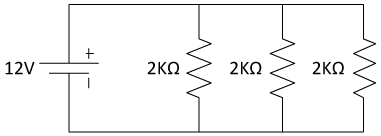Another basic circuit type is the parallel circuit, in which there is more than one current path. To analyze resistors in a series circuit, we found an equivalent resistance. We’ll follow the same strategy in analyzing resistors in parallel.
Resistors in Parallel
Let’s look at a circuit made of the same components we used in our exploration of series circuits, but now we’ll connect our components so as to provide multiple current paths, creating a parallel circuit.

Notice that in this circuit, electricity can follow one of three different paths through each of the resistors. In many ways, this is similar to a river branching into three different smaller rivers. Each resistor, then, causes a potential drop (analogous to a waterfall), then the three rivers recombine before heading back to the battery, which we can think of like a pump, raising the river to a higher potential before sending it back on its looping path.
We can find the equivalent resistance of resistors in parallel using the formula:
![]()
Take care in using this equation, as it’s easy to make errors in performing your calculations. Let’s see if we can find the equivalent resistance for our sample circuit.







